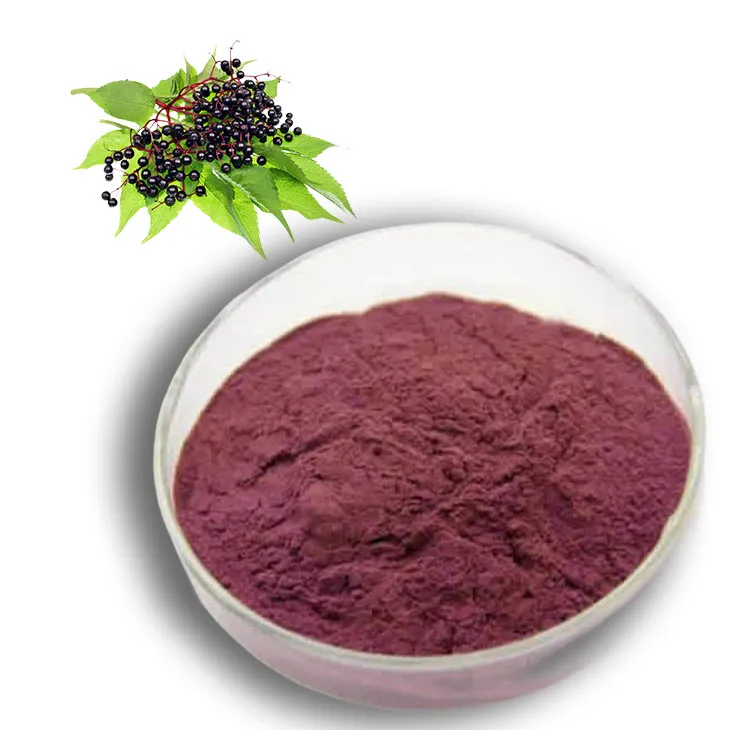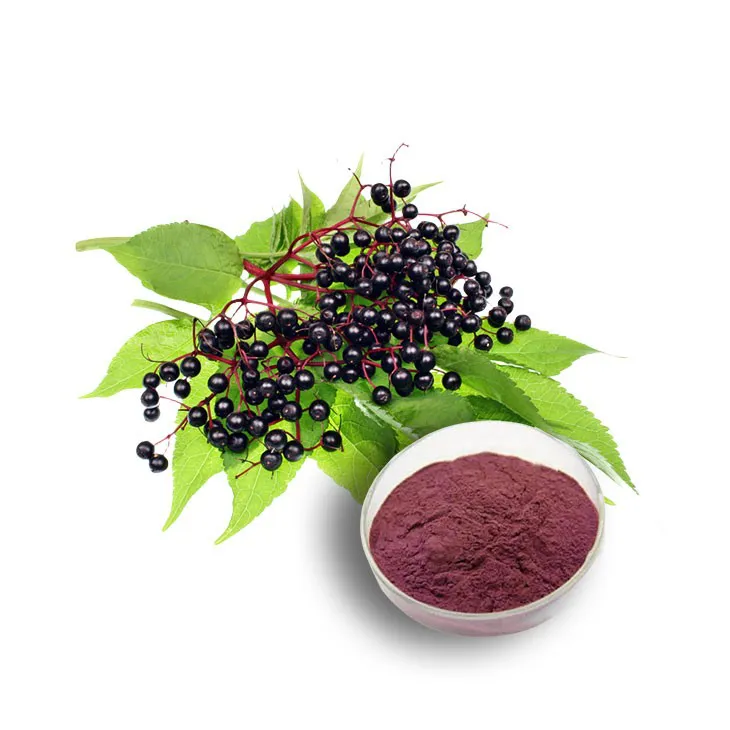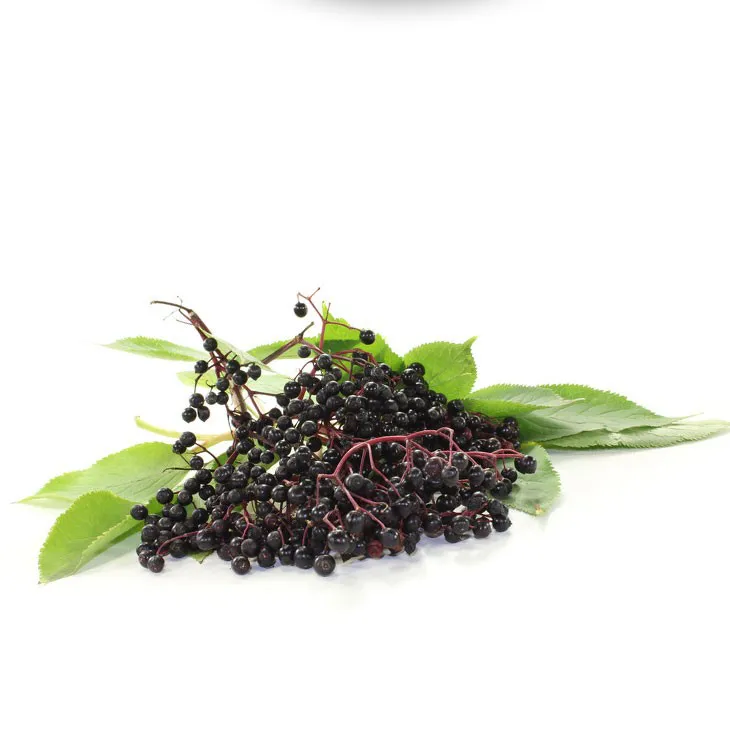- 0086-571-85302990
- sales@greenskybio.com
Elderberry extract can reduce high blood pressure.
2024-11-14

1. Introduction
High blood pressure, or hypertension, is a common health condition that affects a significant portion of the global population. It is a major risk factor for various cardiovascular diseases, including heart attacks, strokes, and heart failure. While there are conventional medical treatments available, many individuals are also interested in exploring alternative approaches. Elderberry Extract has emerged as a potential candidate in the search for natural remedies to combat high blood pressure. This article will explore the properties of Elderberry Extract, its possible effects on blood pressure regulation, and the implications for those seeking alternative ways to manage hypertension.

2. Properties of Elderberry Extract
2.1 Nutritional Composition
Elderberries are rich in a variety of nutrients. They contain vitamins such as vitamin C, which is an antioxidant that helps protect cells from damage. Vitamin C also plays a role in collagen synthesis and immune function. Additionally, elderberries contain minerals like potassium. Potassium is important for maintaining proper heart function and fluid balance in the body. It can help counteract the effects of sodium, which, when in excess, can contribute to high blood pressure.
2.2 Bioactive Compounds
Elderberry extract is known for its high content of flavonoids. Flavonoids are a group of plant - based compounds with antioxidant, anti - inflammatory, and other beneficial properties. Some of the specific flavonoids found in elderberries include anthocyanins. These compounds are responsible for the deep purple color of elderberries and have been studied for their potential health benefits. They can scavenge free radicals in the body, reducing oxidative stress, which is associated with various chronic diseases, including hypertension.

3. Mechanisms of Blood Pressure Regulation by Elderberry Extract
3.1 Vasodilation
One possible mechanism by which elderberry extract may affect blood pressure is through vasodilation. Vasodilation refers to the widening of blood vessels. When blood vessels dilate, the resistance to blood flow decreases, which can lead to a reduction in blood pressure. The flavonoids in elderberry extract may act on the endothelial cells lining the blood vessels. These cells release substances such as nitric oxide, which is a powerful vasodilator. By promoting the release of nitric oxide, elderberry extract can help relax the blood vessels and lower blood pressure.
3.2 Anti - Inflammatory Effects
Chronic inflammation is thought to play a role in the development of hypertension. Elderberry extract, with its anti - inflammatory properties, may help reduce inflammation in the body. Inflammatory processes can damage the blood vessels and disrupt normal blood pressure regulation. By suppressing inflammation, elderberry extract can potentially contribute to more stable blood pressure levels. For example, the flavonoids in elderberry can inhibit the production of inflammatory cytokines, which are molecules that mediate the inflammatory response in the body.
3.3 Renin - Angiotensin - Aldosterone System (RAAS) Modulation
The RAAS is an important hormonal system involved in blood pressure regulation. In some cases of hypertension, the RAAS is overactive. Elderberry extract may have an impact on this system. It could potentially inhibit the activity of renin, an enzyme that plays a key role in the RAAS. By doing so, it may reduce the production of angiotensin II, a hormone that causes blood vessels to constrict and aldosterone, a hormone that promotes sodium and water retention. This modulation of the RAAS can lead to a decrease in blood pressure.

4. Research Evidence on Elderberry Extract and Blood Pressure
Several studies have been conducted to investigate the relationship between elderberry extract and blood pressure. While more research is still needed, the existing evidence shows some promising results.
4.1 Animal Studies
In animal models of hypertension, elderberry extract has been shown to have a beneficial effect on blood pressure. For instance, in a study on rats with induced hypertension, those that received elderberry extract had a significant reduction in blood pressure compared to the control group. The extract was found to improve the endothelial function in the rats' blood vessels, leading to better blood flow and lower pressure. Another animal study demonstrated that elderberry extract could modulate the RAAS in a way that favored blood pressure reduction.
4.2 Human Studies
There have been some small - scale human studies as well. In a pilot study involving a group of individuals with mild hypertension, supplementation with elderberry extract for a certain period showed a trend towards lower blood pressure readings. However, these results need to be further replicated and confirmed in larger, more comprehensive studies. Some limitations of the current human studies include the relatively short duration of supplementation and the small sample sizes. Nevertheless, the initial findings suggest that elderberry extract may hold potential in the management of hypertension in humans.
5. Considerations for Using Elderberry Extract for Hypertension
5.1 Dosage
Determining the appropriate dosage of elderberry extract for blood pressure management is crucial. Different products may contain varying concentrations of active compounds, so it is important to follow the manufacturer's instructions. However, currently, there is no standardized recommended dosage specifically for hypertension. In general, it is advisable to start with a low dose and gradually increase it while monitoring blood pressure and any potential side effects.
5.2 Safety and Side Effects
Elderberry extract is generally considered safe for most people when consumed in moderation. However, some individuals may experience mild side effects such as gastrointestinal discomfort, including nausea, vomiting, or diarrhea. In rare cases, allergic reactions may occur, especially in those who are allergic to elderberries or related plants. Pregnant and breastfeeding women should exercise caution when using elderberry extract, as there is limited research on its safety during these periods.
5.3 Interaction with Medications
If you are taking medications for high blood pressure or other health conditions, it is essential to consult your healthcare provider before starting elderberry extract supplementation. Elderberry may interact with certain medications, such as diuretics or drugs that affect blood clotting. For example, the potassium content in elderberry extract could potentially interact with potassium - sparing diuretics, leading to an excessive build - up of potassium in the body. This could pose a risk to heart function.
6. Incorporating Elderberry Extract into a Lifestyle for Hypertension Management
6.1 Dietary Inclusion
Elderberry extract can be incorporated into the diet in various ways. It is available in supplement form, such as capsules or tablets. These can be taken as part of a daily regimen. Additionally, elderberry - based products like elderberry syrup can be added to foods or beverages. For example, it can be mixed with yogurt or added to a glass of water or tea. However, it is important to be aware of the added sugars in some commercial elderberry syrups, especially for individuals with diabetes or those who need to control their calorie intake.
6.2 Complementary Lifestyle Changes
While elderberry extract may have potential benefits for blood pressure, it should not be considered a substitute for a healthy lifestyle. Combining its use with other lifestyle changes can enhance its effectiveness. Regular exercise is crucial for maintaining healthy blood pressure levels. Aim for at least 150 minutes of moderate - intensity aerobic exercise per week, such as brisk walking or cycling. Dietary modifications also play a significant role. Reducing sodium intake, increasing consumption of fruits and vegetables (in addition to elderberries), and choosing whole grains over refined grains can all contribute to better blood pressure control. Stress management is another important aspect. High stress levels can contribute to hypertension, so techniques such as meditation, deep breathing exercises, or yoga can be helpful in reducing stress and potentially improving blood pressure.
7. Conclusion
Elderberry extract shows potential in the regulation of blood pressure through various mechanisms, including vasodilation, anti - inflammatory effects, and modulation of the RAAS. While there is some research evidence from animal and human studies, more comprehensive and larger - scale studies are needed to fully understand its efficacy and safety for hypertension management. When considering using elderberry extract for high blood pressure, it is important to take into account factors such as dosage, safety, and potential interactions with medications. Incorporating elderberry extract into a holistic lifestyle approach that includes exercise, dietary changes, and stress management may offer a promising alternative or complementary strategy for those looking to manage their hypertension in a more natural way.
FAQ:
What is elderberry extract?
Elderberry extract is a substance derived from the elderberry plant. It contains various bioactive compounds such as anthocyanins, flavonoids, and phenolic acids. These components are thought to contribute to its potential health - promoting properties.
How might elderberry extract reduce high blood pressure?
The possible mechanisms through which elderberry extract could reduce high blood pressure are complex. The flavonoids and anthocyanins in it may have antioxidant and anti - inflammatory effects. By reducing oxidative stress and inflammation in the blood vessels, it may help improve endothelial function. Improved endothelial function can lead to better regulation of blood vessel dilation and constriction, which in turn may contribute to a reduction in blood pressure.
Is elderberry extract a safe alternative for reducing high blood pressure?
Generally, elderberry extract is considered safe for most people when consumed in appropriate amounts. However, some individuals may be allergic to elderberries. Also, it should not be used as a sole replacement for medical treatment for high blood pressure without consulting a doctor. While it may have potential blood - pressure - lowering effects, it has not been fully established as a definitive treatment.
How much elderberry extract should be taken to potentially affect blood pressure?
There is no standardized dosage for using elderberry extract to target blood pressure specifically. Dosage can vary depending on factors such as the form of the extract (e.g., capsules, syrup), the concentration of active compounds, and individual health status. It is important to follow the recommended dosages on product labels or consult a healthcare provider.
Can elderberry extract replace blood pressure medications?
No, elderberry extract cannot replace blood pressure medications at present. Blood pressure medications are carefully formulated and tested to effectively manage hypertension. While elderberry extract may have some beneficial effects on blood pressure, it has not been proven to be as effective as prescribed medications. People with high blood pressure should always consult their doctor before making any changes to their treatment plan.
Related literature
- The Potential of Elderberry in Cardiovascular Health"
- "Elderberry Extract: Properties and Health Implications"
- "Antihypertensive Effects of Plant - Based Extracts: A Focus on Elderberry"
- ▶ Hesperidin
- ▶ citrus bioflavonoids
- ▶ plant extract
- ▶ lycopene
- ▶ Diosmin
- ▶ Grape seed extract
- ▶ Sea buckthorn Juice Powder
- ▶ Beetroot powder
- ▶ Hops Extract
- ▶ Artichoke Extract
- ▶ Reishi mushroom extract
- ▶ Astaxanthin
- ▶ Green Tea Extract
- ▶ Curcumin Extract
- ▶ Horse Chestnut Extract
- ▶ Other Problems
- ▶ Boswellia Serrata Extract
- ▶ Resveratrol Extract
- ▶ Marigold Extract
- ▶ Grape Leaf Extract
- ▶ blog3
- ▶ blog4
- ▶ blog5
-
Organic Tongkat Ali extract powder factory.
2024-11-14
-
How to make powder with ashwagandha extract.
2024-11-14
-
Rosehip extract manufacturers from China.
2024-11-14
-
The best cat's claw extract in nature.
2024-11-14
-
Chinese Dandelion Leaf Extract Suppliers.
2024-11-14
-
Artichoke Extract
2024-11-14
-
Red Wine Extract
2024-11-14
-
Saffron Extract Powder
2024-11-14
-
Lavender Extract
2024-11-14
-
Pomegranate Extract
2024-11-14
-
Centella Asiatica Extract
2024-11-14
-
Curcuma Longa Extract
2024-11-14
-
Peppermint Extract Powder
2024-11-14
-
Red Vine Extract
2024-11-14
-
Green coffee bean Extract
2024-11-14





















